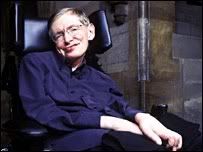
The smile has a lot to do with it. Hawking let it shine a number of times during "The Hawking Paradox," the BBC documentary about his work on black holes. In 1970, Hawking combined the theories of quantum mechanics and general relativity into one neat equation that described the mechanics of black holes:

The equation suggested something controversial -- that black holes would emit radiation. Radiation that would eventually cause a black hole to evaporate and disappear.
Along with everything inside of it.
The idea of information disappearing into a black hole did not sit well with other scientists. It violated a fundamental tenet of physics: that information cannot be destroyed; it may be altered, but it can never disappear. Regardless, Hawking stood firmly by his theory and insisted that information must disappear; after all, that's what his equation suggested, and he knew his equation was right.
*Cue grin*
The argument over the disappearance versus the preservation of information entering black holes became known as the Information Paradox, or the Hawking Paradox. While many scientists refused to believe that information disappeared after entering a black hole, they also remained enamored with the beauty of Hawking's equation and began to explore how both outcomes could coexist. Eventually, an Argentenian physicist named Juan Maldacena crafted an equation that explained how information behaved once it entered black holes -- and the equation showed that information was not lost.
Hawking was not convinced. But before he could dissect Maldacena's paper, he fell gravely ill with pneumonia, and was hospitalized for three months.
During this time, he developed his own answer to the Paradox.
At a conference in 2004, Hawking conceded his earlier argument and presented his modified theory: that black holes emit the information they swallow (extremely altered, of course).
Though many attendees were excited to hear Hawking's announcement, most found the new theory lackluster at best. To this day, he is still working to complete the proof that would prove this theory.
But it's getting harder. By the conclusion of the documentary, Hawking was beginning to lose the ability to manipulate his speaking device with his hand and had to rely on making facial expressions to communicate ideas to his research assistant. When his assistant interpreted incorrectly, Hawking would wince. When he got something right, Hawking would smile.
Today, Hawking operates his speaking device with a muscle under his right eye.
Can you imagine? Sitting there with nothing to do but think, knowing that many of your colleagues think you're wrong, that many of your colleagues think you're crazy, yet still going, continuing to thrive 40 years after they said you would die, never letting up even as you lose control of everything around you - even your ability to communicate?
"I want to understand the Universe, and answer all the big questions. That's what keeps me going."
-Stephen Hawking, 2004
Hawking is preparing to go into space in 2009 and is currently writing a children's book that is "like Harry Potter - without the magic."

2 comments:
I heard he was a spy...
"i spy ... my little eye" gets a whole new meaning.
Post a Comment